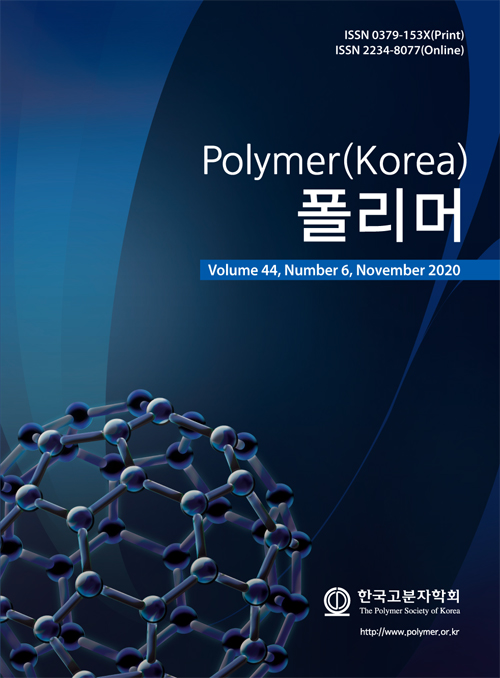- Effect of Photo-initiators on the Crosslinking Behavior of Organic Thin Films and Their Applicability to Flexible Display Encapsulation Layer
Junki Oh# , So Hyun Kim# , Kevin Injoe Jung, June Huh, Hyun Wook Jung†
 , and Joona Bang†
, and Joona Bang† 
Department of Chemical and Biological Engineering, Korea University, Seoul 02841, Korea
- 광개시제 종류에 따른 유기 박막의 경화 특성과 플렉서블 디스플레이 봉지 소재로의 적용성 분석
고려대학교 화공생명공학과
In this work, we examined
photocurable materials for organic layers that can be used as an encapsulation
layer in flexible displays. Photo-initiators, which are essential for
UV-crosslinking, can be classified into two categories: Type-1 initiators that
produce free radicals through the cleavage reaction caused by UV irradiation
and Type-2 initiators that generate free radicals without the cleavage
reaction. Type-2 initiators are more desirable for the encapsulation organic
layer of the flexible display due to the low outgassing of unreacted
components. To optimize the curing properties of organic coatings, the effect
of initiator type on the real-time crosslinking behaviors were mainly
scrutinized. The flow properties of pre-cured coatings such as shear viscosity
and surface tension were also measured to evaluate the applicability in the
inkjet coating process, and transmittance and refractive index were analyzed
for the optical properties of cured thin films. As a result, it was found that
Type-2 initiators, exerting the intrinsic low outgassing performance, are more
advantageous in developing the display encapsulation technology as a key
component in the organic layer.
플렉서블 디스플레이에 적용할 수 있는 유기 박막 개발을
위해 광경화성 소재에 대한 특성화를 진행하였다. 광경화에 필수적인 요소인 광개시제는 광 조사 시 분해되며
라디칼을 생성하는 Type-1 개시제와 분해없이 라디칼을 생성하는
Type-2 개시제 유형으로 구분된다. Type-2 개시제는 미반응물에 의한 아웃가스 배출이
거의 없는 특성으로 인해 디스플레이 봉지 유기층 제조에 결정적인 역할을 할 수 있다. 본 연구에서는
봉지층에 사용될 유기 코팅액의 경화물성을 최적화하기 위해 Type-1, Type-2 개시제에 의한 실시간
가교 물성을 비교 분석하였다. 잉크젯 코팅 공정으로의 적용 가능성을 평가하기 위하여 경화 이전 코팅액의
점도와 표면 장력 등과 같은 기본 유동 물성을 측정하였다. 또한 경화된 박막 필름의 투과율, 굴절률 등과 같은 광학적 물성들을 분석하였다. 다양한 실험 결과로부터
아웃가스 저배출 성능이 뛰어난 Type-2 개시제가 유기막의 핵심 성분으로 디스플레이 봉지 기술을 개발하는데
매우 유용함을 확인하였다.
Keywords: photo-initiator, organic layer, encapsulation, outgas, flexible display
- Polymer(Korea) 폴리머
- Frequency : Bimonthly(odd)
ISSN 0379-153X(Print)
ISSN 2234-8077(Online)
Abbr. Polym. Korea - 2023 Impact Factor : 0.4
- Indexed in SCIE
 This Article
This Article
-
2020; 44(6): 841-847
Published online Nov 25, 2020
- 10.7317/pk.2020.44.6.841
- Received on Jun 21, 2020
- Revised on Jul 1, 2020
- Accepted on Jul 4, 2020
 Correspondence to
Correspondence to
- Hyun Wook Jung and Joona Bang
-
Department of Chemical and Biological Engineering, Korea University, Seoul 02841, Korea
- E-mail: hwjung@grtrkr.korea.ac.kr, joona@korea.ac.kr









 Copyright(c) The Polymer Society of Korea. All right reserved.
Copyright(c) The Polymer Society of Korea. All right reserved.